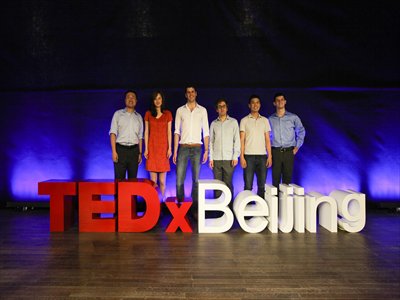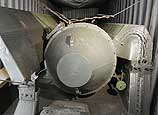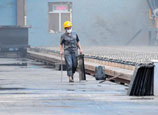
 |
| Speakers of TEDxBeijing event on July 13 Photo: Courtesy of TEDxBeijing |
Related reading:
Young artists to gather for China youth festival
People are always eager for inspiration. Like a movie once said, "A man may die, but 400 years later, an idea can still change the world."
The power of an idea can change attitudes, lives and ultimately the world. That's the motto of TED (Technology, Entertainment, Design), and also the reason why its series of conferences have grown into a global craze. The "riveting talks by remarkable people" on the TED stage have been viewed, shared, and loved by countless people around the world.
In order to bring the TED spirit - "ideas worth spreading" - to every corner of the world, the organization carried out a program called TEDx that gives communities, groups and individuals the opportunity to stimulate dialogue through TED-like experiences at the local level. Now, the trend has spread to China
On July 13, TEDxBeijing gathered a few creative thinkers to give speeches under the theme "Old City, New Soul" in 751 D-Park. With the idea of making people aware of how Beijing changes and how to balance traditions and innovations, the event attracted many TED lovers.
But TEDxBeijing is not the only TED event in the capital. The TEDxFactory798, which held their latest event in May, and the TEDxRelightBridge, which is holding its first event on July 20, are also integral in the development of the TEDx team in China.
Driven by young minds
TED-related activities in China started many years ago. There's the well-known TEDtoChina, which is dedicated to building a community for Chinese TED fans and providing translation subtitles to all TED talks, as well as various local TEDx events like the ones in Beijing, Guangzhou and Chengdu. And all those events were initiated voluntarily by TED fans.
James Flanagan, one of the organizers of the TEDxBeijing, has been living in China for seven years, and he started to organize events about five years ago. Being involved with TED-related events for such a long period, he has met numerous TEDsters and TEDx organizers.
He pointed out that the average age of Chinese organizers is much younger than in the rest of the world. Here, most are in their twenties and thirties, and many of them are still in universities or are recent graduates. In other countries organizers are mostly in their forties, fifties or above. "Maybe the older people see things differently than youngsters, and the youngsters have easier access to the Internet and social media," said Flanagan.
The Beijing team includes nearly 30 volunteers who are keen on stimulating dialogue and spreading ideas from the great thinkers and doers to the public. From calling up volunteers, finding sponsors, gathering speakers, to actually presenting those talks, they prepare for months. Not a single phase is easy, especially finding sponsors. "It really takes great motivation to do this," Flanagan commented, pointing out that no one profits from the activities and most members of the all-volunteer staff have other full-time jobs.
In terms of motivation, the organizer of TEDxRelightBridge, Lü Zhongyan, also shared his own story. As an active TED fan, he became involved in TEDx events while he was a student at Renmin University of China. Once when searching for future TEDx topics, an encounter with a visually impaired girl named Nina inspired him.
Meeting Nina gave him the chance to get to know blind people and learn what their life is like. So he decided to do a special TEDx event, the TEDxRelightBridge, focused on the visually impaired. They hope to let more people become aware that blind people are ordinary people as well, and we don't need to speak louder, slower or try to provide special care when we talk to them.
These are just two examples among all the events across the world that illustrate the difference TED volunteers are making as they endeavor to spread great ideas.
The rules of TEDx
The number of TEDx events is expanding at a staggering rate, and according to an article in The Economist last year, nearly six TEDx events are occurring around the world everyday. Amid the supporting voices, certain worries arise. What if somebody uses TED, this famous non-profit brand to make a profit from organizing events? What if those events become commercials?
In order to prevent this, TED has issued a set of rules. First is the license: No TEDx event is allowed to use TED's name without a proper license. To apply for a license, all organizers need to provide detailed information including the topic, the place, the identity of the speaker and that speaker's credentials.
Furthermore, during each event, commercials for sponsors are not permitted. Even the entry fee, if any, must be approved by TED.
To ensure all goes according to the rules, TED ambassadors are located in many big cities, and their responsibilities include supervising those events.
After every event, questionnaires are handed out to the audience and organizers are required to submit them along with a video of the talk and any related information back to TED.
The rules are detailed, but the supervisory phase is challenging due to the large number of events scattered around. However, as the rules are consistently applied around the globe, TED lovers can distinguish whether an event is qualified or not.
Organizers are trying their best to follow the TED rules while dealing with various difficulties when arranging local events. "Finding a sponsor is the most difficult part," said Lü. But even though it's hard, to run in accordance with TED's non-profit status, he uses his own money to maintain the operation of TEDxRelightBridge.
When talking about their event, organizers of TEDxBeijing, James Flanagan and Yin Mei, also expressed that providing an occasion to let those great thinkers meet and share their views is meaningful. "They think they are doing something that is worth doing. People who are smarter than you, they come along to share their experiences with you," said Flanagan.
Although certain disagreements come along, the supporting voices far outnumber the dissenting ones. According to Yin, who also has experience organizing art and cultural events in China, they really appreciate the great support they have received from others. "The only complaint I heard came from those who couldn't get in."
TEDx events are still being carried out, like the upcoming TEDxRelightBridge. More people are joining the team to let great ideas spread. Because, just as the motto of TED goes, they believe that ideas can ultimately change the world.
















 China’s weekly story
China’s weekly story
(2013.7.5-7.12)


![]()
